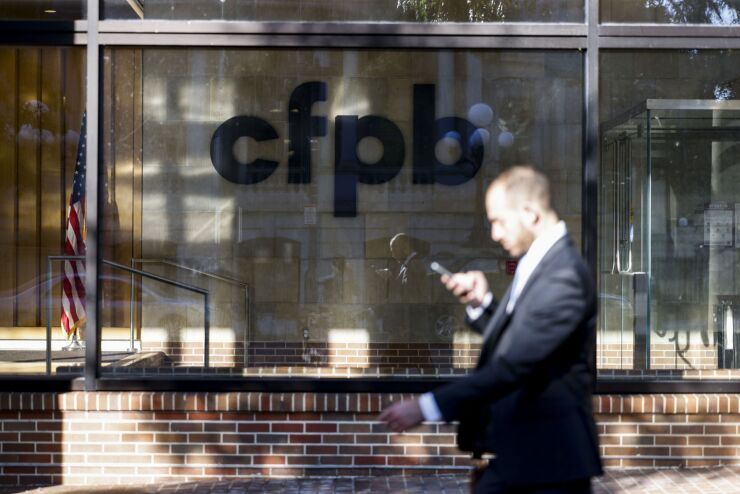Key insight: The Consumer Financial Protection Bureau released a jam-packed rulemaking agenda for the year ahead.
Supporting data: The latest unified agenda lists 24 rulemakings including five final rules, 10 proposed rules, 9 pre-rules and one long-term item.
What's at stake: The bureau is in a legal battle to fire between 80% and 90% of its employees, making executing an ambitious agenda more difficult.
The Consumer Financial Protection Bureau plans to rewrite Biden-era rules in the next year on
The CFPB released a list on Thursday of
One lawyer compared the CFPB's agenda to an all-you-can-eat buffet, with the agency piling rules on its plate that it may be unable to finish.
Some of the CFPB's changes, such as to the
The jam-packed list includes a proposal to remove the
It also includes a longstanding effort by Republicans to water down or eliminate the payday lending rule, which applies not only to payday lenders but also to auto title loans, buy now, pay later arrangements and certain high-cost installment loans. The bureau also plans to eliminate a recently-established
What is unclear is how the CFPB will achieve its deregulatory goals given that the Trump administration wants to
"Even fully-staffed, the CFPB never had this much on its agenda," said Christopher Willis, a partner at the law firm Troutman Pepper Locke. "It's obviously very large in its level of ambition, and when you have the [Trump] administration saying they want to cut the staff by 80% to 90%, doing all of this seems like it would require a lot of people — or take forever."
The Trump administration plans to rescind two final rules including Regulation X, enacted during the pandemic to prohibit kickbacks and ensure fair treatment in loan servicing, and state official notification requirements.
Three rules that the CFPB listed as in the final rule stage include streamlining mortgage servicing for borrowers experiencing payment difficulties, changing rules around remittance transfers, and adopting uniform data standards under the Financial Data Transparency Act.
The bureau listed the CFPB's ability-to-repay and qualified mortgage framework as a long-term agenda item. Both rules form the backbone of responsible lending, and were enacted after the financial crisis of 2008.
"Any time the CFPB reopens mortgage servicing or loan originator compensation rules, the ripple effects are enormous," Mike Canning, founder and principal at consulting firm LCR Group and former House Financial Services Committee senior policy advisor. "These policies don't just affect lenders—they determine how credit flows, how borrowers are treated when they hit hardship, and ultimately the stability of the housing market itself."
A change to mortgage servicing could be problematic.
"Mortgage rules are among the most consequential levers the CFPB can pull. They set standards that touch nearly every American household, so the stakes could not be higher," Canning said. "Even small tweaks there can reshape who gets a mortgage and at what cost. That's why the industry—and consumers—pay such close attention whenever the bureau signals changes."
The court case with the CFPB's union could drag on for months, experts say. Last week, an appeals court vacated a preliminary injunction potentially allowing substantial layoffs at the agency, but the injunction remains in effect while the union appeals.
In the meantime, the CFPB is relying on unnamed political appointees that it has been hiring in the past month to help with rule-writing, and on staff at the Office of Management and Budget, according to CFPB employees who spoke on the condition of anonymity for fear of retaliation. Vought heads both the OMB and CFPB, and has hired several OMB staffers to work at the CFPB rather than have existing staff do the work.
The CFPB lists 24 rules on its agenda, double the number listed in the fall regulatory agenda announced in 2024. There are five final rules, 10 proposed rules, nine pre-rules and one long term action related to the requirement that mortgage lenders determine a borrower's ability to repay a loan, mandated by the Dodd-Frank Act, and the definition of "qualified mortgages," that address liability for high-cost mortgage loans.
Lisa Cole, the CFPB's acting assistant director for Regulations, said in the agenda's brief
Jonathan Pompan, a partner at the law firm Venable, said regulatory agendas "are often aspirational," and "in today's climate this one is more informative than in past years."
"Deregulation isn't a surprise, and some firms may welcome it, but the real question is impact and durability," said Pompan. "The impact may be limited if the bureau had no real intent to use those rules in the first place."
Five of the rules that the CFPB listed in the "pre-rule" stage may have no practical impact because the CFPB under Vought currently
Still, once a final rule is rescinded, it may be hard for a future administration to restore, given that they would have to build a record, and face potential litigation and pushback, Pompan said. Moreover, some of the rules scheduled for changes have been pending on the CFPB's agenda for years.
Another potential issue is that the deadlines for some of the rules will run up to the next presidential election cycle, and if the White House changes hands, the next administration could change the rules again, lawyers say.







